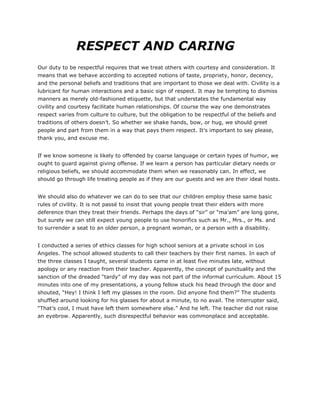Pastel (4)
- 1. RESPECT AND CARING Our duty to be respectful requires that we treat others with courtesy and consideration. It means that we behave according to accepted notions of taste, propriety, honor, decency, and the personal beliefs and traditions that are important to those we deal with. Civility is a lubricant for human interactions and a basic sign of respect. It may be tempting to dismiss manners as merely old-fashioned etiquette, but that understates the fundamental way civility and courtesy facilitate human relationships. Of course the way one demonstrates respect varies from culture to culture, but the obligation to be respectful of the beliefs and traditions of others doesnĪ»t. So whether we shake hands, bow, or hug, we should greet people and part from them in a way that pays them respect. ItĪ»s important to say please, thank you, and excuse me. If we know someone is likely to offended by coarse language or certain types of humor, we ought to guard against giving offense. If we learn a person has particular dietary needs or religious beliefs, we should accommodate them when we reasonably can. In effect, we should go through life treating people as if they are our guests and we are their ideal hosts. We should also do whatever we can do to see that our children employ these same basic rules of civility. It is not pass©” to insist that young people treat their elders with more deference than they treat their friends. Perhaps the days of Ī░sirĪ▒ or Ī░maĪ»amĪ▒ are long gone, but surely we can still expect young people to use honorifics such as Mr., Mrs., or Ms. and to surrender a seat to an older person, a pregnant woman, or a person with a disability. I conducted a series of ethics classes for high school seniors at a private school in Los Angeles. The school allowed students to call their teachers by their first names. In each of the three classes I taught, several students came in at least five minutes late, without apology or any reaction from their teacher. Apparently, the concept of punctuality and the sanction of the dreaded Ī░tardyĪ▒ of my day was not part of the informal curriculum. About 15 minutes into one of my presentations, a young fellow stuck his head through the door and shouted, Ī░Hey! I think I left my glasses in the room. Did anyone find them?Ī▒ The students shuffled around looking for his glasses for about a minute, to no avail. The interrupter said, Ī░ThatĪ»s cool, I must have left them somewhere else.Ī▒ And he left. The teacher did not raise an eyebrow. Apparently, such disrespectful behavior was commonplace and acceptable.
